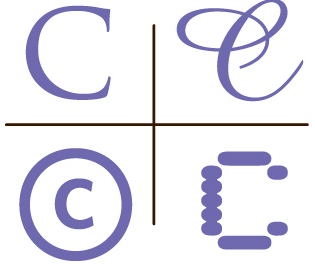Choosing a research question is a process of exploring what interests you. After choosing an initial topic, you may need to focus on just one small piece of it as you start your research. The key to choosing and researching any topic it to find something that is neither too broad or too narrow.
To help you understand the research cycle and how to choose an appropriate topic, watch this topic video from North Carolina State University Library.
As you think about research topics and the question you would like to answer, search in a library database to get more ideas:
Credo Reference
 Articles from dictionaries, general and subject encyclopedias, handbooks, atlases, and more.
Articles from dictionaries, general and subject encyclopedias, handbooks, atlases, and more.
Gale eBooks
 Selected dictionaries, encyclopedias, and reference books in many subjects.
Selected dictionaries, encyclopedias, and reference books in many subjects.
Opposing Viewpoints (Gale In Context)
 Topic overviews, opinion articles, and additional sources on social, economic, and political issues.
Topic overviews, opinion articles, and additional sources on social, economic, and political issues.
Issues & Controversies
A collection of issue overviews, pro/con articles, court case summaries, editorial cartoons, and other resources for debate on controversial topics.
To help you understand the research cycle and how to choose an appropriate topic, watch this topic video from North Carolina State University Library.
As you think about research topics and the question you would like to answer, search in a library database to get more ideas:
Credo Reference
 Articles from dictionaries, general and subject encyclopedias, handbooks, atlases, and more.
Articles from dictionaries, general and subject encyclopedias, handbooks, atlases, and more. Gale eBooks
 Selected dictionaries, encyclopedias, and reference books in many subjects.
Selected dictionaries, encyclopedias, and reference books in many subjects. Opposing Viewpoints (Gale In Context)
 Topic overviews, opinion articles, and additional sources on social, economic, and political issues.
Topic overviews, opinion articles, and additional sources on social, economic, and political issues. Issues & Controversies
A collection of issue overviews, pro/con articles, court case summaries, editorial cartoons, and other resources for debate on controversial topics.
Academic Search Complete (EBSCOhost)
Articles in all subjects from scholarly journals, magazines, and newspapers. An all-purpose database and often a good place to start.
Academic OneFile (Gale)
 Articles in all subjects from scholarly journals, magazines, and newspapers. An all-purpose database.
Articles in all subjects from scholarly journals, magazines, and newspapers. An all-purpose database.
ProQuest News & Newspapers
JSTOR
 Scholarly articles, ebooks, and primary sources in the social sciences, humanities, earth and biological sciences, and more. Includes images from libraries, museums, and archives.
Scholarly articles, ebooks, and primary sources in the social sciences, humanities, earth and biological sciences, and more. Includes images from libraries, museums, and archives.
Book Search
Still stuck? The Library has lots of databaes. Try looking in this list for more options:
All Library Databases by Subject/Type
All of the library's online collections, organized by subject or type.
Articles in all subjects from scholarly journals, magazines, and newspapers. An all-purpose database and often a good place to start.
Academic OneFile (Gale)
 Articles in all subjects from scholarly journals, magazines, and newspapers. An all-purpose database.
Articles in all subjects from scholarly journals, magazines, and newspapers. An all-purpose database. ProQuest News & Newspapers
News articles from U.S. newspapers. Includes the Washington Post, Wall Street Journal, Los Angeles Times, Chicago Tribune, Star Tribune, and many local newspapers.
JSTOR
 Scholarly articles, ebooks, and primary sources in the social sciences, humanities, earth and biological sciences, and more. Includes images from libraries, museums, and archives.
Scholarly articles, ebooks, and primary sources in the social sciences, humanities, earth and biological sciences, and more. Includes images from libraries, museums, and archives. Book Search
Still stuck? The Library has lots of databaes. Try looking in this list for more options:
All Library Databases by Subject/Type
All of the library's online collections, organized by subject or type.
Picking a Research Topic
Narrowing down your research topic makes your research easier and increases your ability to persuade your audience. As you begin researching, look for opportunities to narrow your research question.
Choosing and Using Keywords
If you can’t find much on your topic, try different keywords. Using synonyms or broader related terms can help you find more articles. As you research, be on the lookout for new keywords to use.
Research is a process. You probably won’t find everything you need on the first try. You may have to try several library databases to find all the information you need.
Narrowing down your research topic makes your research easier and increases your ability to persuade your audience. As you begin researching, look for opportunities to narrow your research question.
Choosing and Using Keywords
If you can’t find much on your topic, try different keywords. Using synonyms or broader related terms can help you find more articles. As you research, be on the lookout for new keywords to use.
Research is a process. You probably won’t find everything you need on the first try. You may have to try several library databases to find all the information you need.

Call, e-mail, or chat with a librarian for more research assistance. We're happy to help!
(952) 358-8290
Email
 David Vrieze Daniels
David Vrieze DanielsReference and Instruction Librarian
david.vriezedaniels@normandale.edu
Note: Your chat question may be directed to a librarian from another college when Normandale librarians are unavailable.
Evaluate each source you use with CAPPS!
Consider the source's –
Consider the source's –
C = Currency
A = Author
P = Publication
P = Point of View
S = Sources
More info about CAPPS A = Author
P = Publication
P = Point of View
S = Sources
MLA Quick Guide (PDF)
See MLA citation examples for the most common types of sources (9th edition).
MLA Formatting and Style Guide (OWL at Purdue)
This website offers examples for the general format of MLA research papers, in-text citations, and the Works Cited page. Uses MLA 9th edition.
See MLA citation examples for the most common types of sources (9th edition).
MLA Formatting and Style Guide (OWL at Purdue)
This website offers examples for the general format of MLA research papers, in-text citations, and the Works Cited page. Uses MLA 9th edition.
APA Quick Guide (PDF)
See APA citation examples for the most common types of sources (7th edition).
APA Formatting and Style Guide (OWL at Purdue)
A comprehensive guide to APA formatting and style (7th edition). See examples of APA formats for papers, References lists, in-text citations, footnotes, and more.
See APA citation examples for the most common types of sources (7th edition).
APA Formatting and Style Guide (OWL at Purdue)
A comprehensive guide to APA formatting and style (7th edition). See examples of APA formats for papers, References lists, in-text citations, footnotes, and more.
Online Library Access Info
To access databases and other Library resources, login with your StarID and password when prompted. Access is only available to current Normandale students and employees.
To access databases and other Library resources, login with your StarID and password when prompted. Access is only available to current Normandale students and employees.